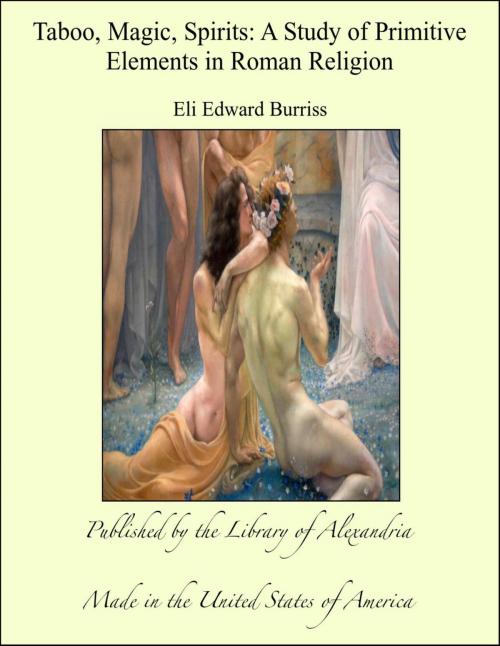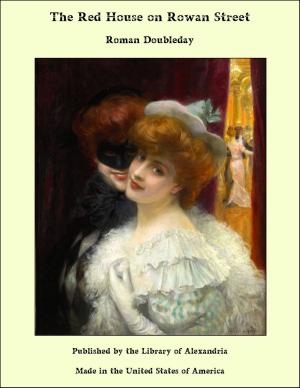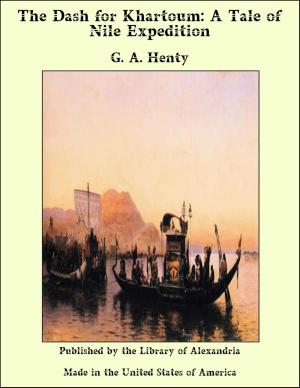Taboo, Magic, Spirits: A Study of Primitive Elements in Roman Religion
Nonfiction, Religion & Spirituality, New Age, History, Fiction & Literature| Author: | Eli Edward Burriss | ISBN: | 9781465577047 |
| Publisher: | Library of Alexandria | Publication: | March 8, 2015 |
| Imprint: | Language: | English |
| Author: | Eli Edward Burriss |
| ISBN: | 9781465577047 |
| Publisher: | Library of Alexandria |
| Publication: | March 8, 2015 |
| Imprint: | |
| Language: | English |
ROMAN religion, as we meet it in historical times, is a congeries of many elements. One of the problems of the modern scholar is to separate and interpret these various elements--primitive, Latin, Etruscan, Greek, Oriental. Even the casual student of comparative religion, who is also familiar with Latin literature, cannot fail to recognize, running through the enormous mass of facts and ideas about religion and superstition, elements which are common to all religions, past and present, whether among savages or civilized men. Such elements, when discovered in a developed religion, may fairly be called primitive. In the study of the religion of any people, the starting point should be with these common elements. However, it has usually been the habit of scholars to trace the development of gods and goddesses, rites and priesthoods, to their historical sources, and to describe and interpret the Roman calendar with its many festivals; and if primitive elements have been treated at all, they have formed part of a larger work, or have been rather cursorily dismissed to clear the way for a study of the religion of the organized Roman State. Thus W. Warde Fowler, in The Roman Festivals of the Period of the Republic, and Georg Wissowa, in his Religion und Kultus der Romer, were concerned primarily with the facts of historical Roman religion. Fowler, to be sure, devoted two chapters in The Religious Experience of the Roman People to a study of primitive elements, but he was clearly anxious to hurry on to his main theme. H. J. Rose, in his Primitive Culture in Italy, has discussed briefly, but with sound scholarship, primitive elements in Roman religion as part of the general subject of primitive culture in Italy; and Jesse Benedict Carter, following afar his master Wissowa, seems to have had slender knowledge of comparative religion. To Sir J. G. Frazer scholars owe much for his valuable collection of rites and ideas parallel to those of the Romans. The Golden Bough is a veritable mine of such information; and the author's more recent work, his edition of the Fasti of Ovid, is indispensable to the student of the subject. The latter reached my hands after I had completed the first draft of my manuscript for publication. Because of the pertinence of his notes on the passages from Ovid's Fasti which I have used in this work, I have included in the footnotes references to Frazer's work wherever possible.
ROMAN religion, as we meet it in historical times, is a congeries of many elements. One of the problems of the modern scholar is to separate and interpret these various elements--primitive, Latin, Etruscan, Greek, Oriental. Even the casual student of comparative religion, who is also familiar with Latin literature, cannot fail to recognize, running through the enormous mass of facts and ideas about religion and superstition, elements which are common to all religions, past and present, whether among savages or civilized men. Such elements, when discovered in a developed religion, may fairly be called primitive. In the study of the religion of any people, the starting point should be with these common elements. However, it has usually been the habit of scholars to trace the development of gods and goddesses, rites and priesthoods, to their historical sources, and to describe and interpret the Roman calendar with its many festivals; and if primitive elements have been treated at all, they have formed part of a larger work, or have been rather cursorily dismissed to clear the way for a study of the religion of the organized Roman State. Thus W. Warde Fowler, in The Roman Festivals of the Period of the Republic, and Georg Wissowa, in his Religion und Kultus der Romer, were concerned primarily with the facts of historical Roman religion. Fowler, to be sure, devoted two chapters in The Religious Experience of the Roman People to a study of primitive elements, but he was clearly anxious to hurry on to his main theme. H. J. Rose, in his Primitive Culture in Italy, has discussed briefly, but with sound scholarship, primitive elements in Roman religion as part of the general subject of primitive culture in Italy; and Jesse Benedict Carter, following afar his master Wissowa, seems to have had slender knowledge of comparative religion. To Sir J. G. Frazer scholars owe much for his valuable collection of rites and ideas parallel to those of the Romans. The Golden Bough is a veritable mine of such information; and the author's more recent work, his edition of the Fasti of Ovid, is indispensable to the student of the subject. The latter reached my hands after I had completed the first draft of my manuscript for publication. Because of the pertinence of his notes on the passages from Ovid's Fasti which I have used in this work, I have included in the footnotes references to Frazer's work wherever possible.















